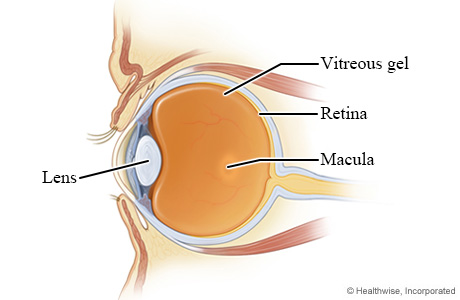Vitrectomy: What to Expect at Home
Your Recovery

Vitrectomy is a surgery to remove the vitreous gel from the middle
of your eye. Vitreous gel (also called vitreous humor) is a thick,
colorless, gel-like fluid that fills the large space in the middle
of the eye, behind the lens. It helps the eyeball maintain its
shape.
During surgery, the doctor used small tools to remove the vitreous
gel. (After a while, the eye makes new fluid that fills in the space
again.) Then the doctor may have treated eye problems, such as a
retinal detachment, a vitreous hemorrhage (bleeding in the eye),
scar tissue on the retina, or tears or holes in the macula, an
important part of the retina. The retina is the layer of nerve
tissue at the back of the eye.
At the end of the surgery, the doctor may have injected an oil or
gas bubble into the eye. It lightly presses the retina against the
wall of the eye. You will need to keep your head in a certain
position for most of the day and night while the eye heals. If an
oil bubble is used, you will need another surgery to remove the oil
after the eye has healed.
After the surgery, your eye may be swollen, red, or tender for
several weeks. You might have some pain in your eye and your vision
may be blurry for a few days after the surgery. You will need 2 to 4
weeks to recover before you can do your normal activities again. It
may take longer for your vision to get back to normal.
This care sheet gives you a general idea about how long it will take
for you to recover. But each person recovers at a different pace.
Follow the steps below to get better as quickly as possible.
How can you care for yourself at home?

Activity
|
|
|
|
|
|
|
|
-
If your doctor used an oil or gas bubble to hold the
retina in place, keep your head in a certain position for
a few days or longer after the surgery. Make a plan for
this part of your recovery, because it will be hard to do
some daily activities. Your doctor will give you specific
instructions.
|
|
|
|
|
|
|
|
|
|

Diet
|
|
-
You can eat your normal diet. If your stomach is upset,
try bland, low-fat foods like plain rice, broiled chicken,
toast, and yogurt.
|

Medicines

Ice and elevation

Other
instructions
Follow-up care is a key part of your treatment and safety. Be
sure to make and go to all appointments, and call your doctor if you
are having problems. It's also a good idea to know your test results
and keep a list of the medicines you take.
When should you call for help?
 Call 911 anytime you think you may need emergency care.
For example, call if:
Call 911 anytime you think you may need emergency care.
For example, call if:
Call your doctor now or seek immediate medical care if:
Watch closely for changes in your health, and be sure to contact
your doctor if:
Current as of: June 5, 2023
Content Version: 14.0
Care instructions adapted under license by your healthcare professional. If you have questions about a medical condition or this instruction, always ask your healthcare professional. Healthwise, Incorporated disclaims any warranty or liability for your use of this information.